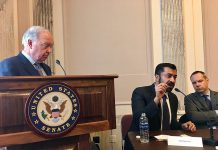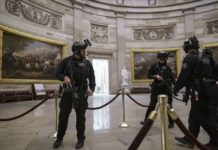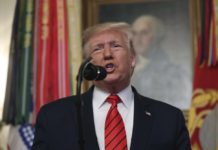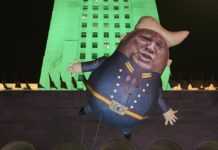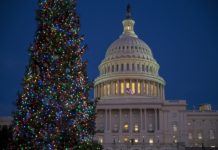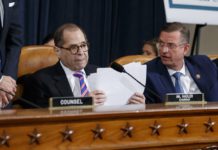BRUSSELS (AP) — With long-standing European alliances facing new strain, President Donald Trump chastised NATO member nations for not paying their fair share to protect the long-standing pact and declined to explicitly endorse its mutual defense agreement.
That unprecedented one-two punch from a president in his first major speech in Europe further rattled a continent anxious about Trump’s commitment to their bonds and reeling from another deadly terror attack.
The aftermath of that attack in Manchester, England, has produced further tension, as a British official said that police have decided not to share further information on the investigation due to leaks blamed on U.S. officials. Trump, who said there is “no relationship we cherish more” than the one with the United Kingdom, declared the leaks “deeply troubling” and said he was asking the Justice Department to lead an investigation into the matter.
“These leaks have been going on for a long time and my administration will get to the bottom of this,” Trump said in a written statement. “The leaks of sensitive information pose a grave threat to our national security.”
Trump issued his sharp rebuke from Brussels, a city he called a “hellhole” in 2016, where he was addressing leaders at both the European Union and NATO, a pair of alliances whose necessity he has questioned.
At NATO’s gleaming new headquarters, Trump returned to his longstanding call for member nations to pay their fair share, lecturing leaders like German chancellor Angela Merkel and new French President Emmanuel Macron about contributing more as they stood listening in awkward silence.
“This is not fair to the people and taxpayers of the United States,” Trumps said in brief remarks. “If NATO countries made their full and complete contributions, then NATO would be even stronger than it is today, especially from the threat of terrorism.”
The 28 member nations, plus soon-to-join Montenegro, will renew an old vow to move toward spending 2 percent of their gross domestic product on defense by 2024. Only five members currently meet the target: Britain, Estonia, debt-laden Greece, Poland and the United States, which spends more on defense than all the other allies combined.
Moreover, the White House had sent recent signals that the United States would stay in NATO’s mutual defense pact, known as Article 5, which had been invoked just once before: after the terror attack of September 11, 2001. But Trump made no mention of the Article 5 commitment as he spoke next to a new monument centered on steel from the crumpled World Trade Center.
Asked about Trump not explicitly affirming U.S. support for Article 5, White House press secretary Sean Spicer said: “It goes without saying. His presence at this event underscores our commitments and treaty obligations.”
Trump’s speech at NATO came hours after the EU council president said a discussion with him produced sharply different views on Russia. And Macron pushed Trump on a sweeping climate agreement and even engaged in an apparent handshake stand-off.
British Prime Minister Theresa May said she plans to discuss the leaks with her American counterpart at the NATO gathering to “make clear to President Trump that intelligence that is shared between our law enforcement agencies must remain secure.”
British officials are particularly angry that photos detailing evidence about the bomb used in the Manchester attack were published in The New York Times, although it’s not clear that the paper obtained the photos from U.S. officials.
Trump, who unlike other leaders at the summit is not planning to address reporters, did not respond to shouted questions as to whether the U.K. can trust the U.S. with sensitive material.
Trump and his White House have long complained about “leakers” they think are trying to undermine his presidency. While all administrations deal with some leaks, news outlets have been privy to everything from details of draft documents to the president’s private phone conversations with foreign leaders.
Recently in the news were reports that the president had shared highly classified information with Russian officials during an Oval Office meeting, revealed by those with knowledge of the conversation.
Trump’s remarkable public scolding of NATO comes amid of backdrop of uncertainty in Brussels toward Trump over his past comments publicly cheering the United Kingdom’s vote to leave the EU last summer and slamming the alliance during his transition as “a vehicle for Germany.” Though he ran a campaign of “American First” with suggestions of disentangling from international deals, Trump has taken a less combative tone since taking office, praising the alliance as “wonderful” and saying a strong Europe is very important to him and the United States.
After meeting with Trump on Thursday at the EU, European Council president Donald Tusk said he and the U.S. president agreed on the need to combat terrorism but some differences loomed large.
“Some issues remain open, like climate and trade. And I am not 100 percent sure that we can say today — we means Mr. President and myself — that we have a common position, common opinions about Russia,” said Tusk, who said unity needed to be found around values like freedom and human rights and dignity.
Trump also had lunch with Macron, who has been critical of the Republican president. As the press watched, the two men exchanged a very firm handshake during their meeting, both men gripping tight, their faces showing the strain.
Trump also scored a hoped-for win from NATO, which joined the 68-nation international coalition fighting the Islamic State. An anti-terror coordinator may also be named. But most changes will be cosmetic, as NATO allies have no intention of going to war against IS.



